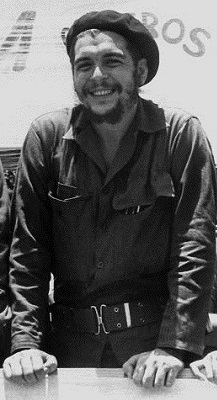|
~ Ernesto Che Guevara
~ Galéria
~ Oldal
~ Bejelentkezés
~ Vissza a Főoldalra
Ernesto Che Guevara, az argentin származású forradalmár, miniszter, gerillavezér és író, Buenos Aires-ben szerzett orvosi diplomát, majd a kubai forradalom során jelentős szerepet játszott a szigetország felszabadításában és újjáépítésében. A kubai gazdaság talpraállításáért dolgozott, küzdött az oktatás és az egészségügy fejlesztéséért, az írástudatlanság és a faji előítéletek felszámolásáért. Saját példájával népszerűsítette az önkéntes munkát. Kongóban és Bolíviában is harcolt - harminckilenc éves volt, amikor az amerikai-bolíviai csapatok csapdába ejtették és kivégezték.
| | |
|

| | |
|
|
|
Charge: Che Guevara was a mass murderer
|
|
|
The most popular attack on Che Guevara is that he was a cold-blooded murderer.
Let’s be honest. Yes, he killed people – he killed enemy soldiers when he was fighting in Cuba, in the Congo and in Bolivia. He killed deserters and traitors to the revolution. He killed murderers and rapists who committed their crimes against the Cuban peasants during the Revolutionary War. After the Revolution, he gave death penalty to all those people who committed crimes against civilians during the Batista regime.
Just one remark: at war soldiers kill soldiers – in every country. If a soldier kills an enemy soldier, he is considered a hero. Why is it only Che Guevara who has been called a bloody murderer while he did just the same thing that every soldier does?
Che believed in the necessity of violent fight during the revolutionary struggle (after witnessing how the US-backed force brutally overthrew the democratically elected government in Guatemala) – but he never killed people for fun. He shot enemy soldiers during the fights but he also gave the injured ones first aid and medical help. When he knew that there were civilians around, he did his best to keep them away from the battlefield.
[Read the whole article]
|
|
|


| | |
|
|
|
~ Ernesto Che Guevara
~ Gallery
~ Site
~ Log in
~ Back to the Main page
Ernesto Che Guevara, the Argentine-born revolutionary, minister, guerrilla leader and writer, received his medical degree in Buenos Aires, then played an essential part in the Cuban Revolution in liberating and rebuilding the country. He did his best to set up the Cuban economy, fought for the improvement of the education and the health system, the elimination of illiteracy and racial prejudice. He promoted voluntary work by his own example. He fought in the Congo and in Bolivia - he was thirty-nine years old, when he was trapped and executed by the joint American-Bolivian forces.
| | |
|
|

